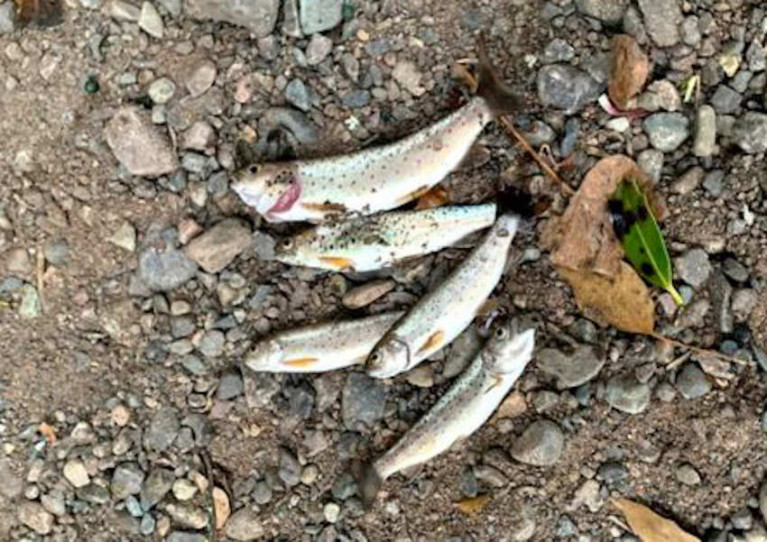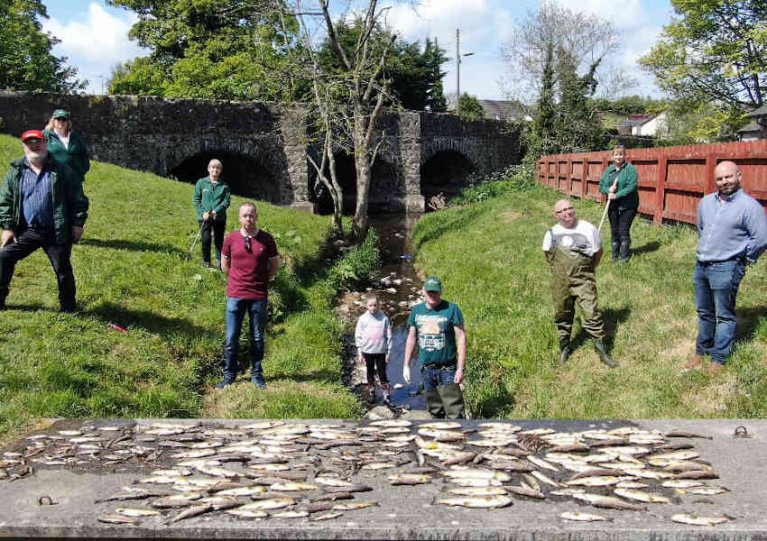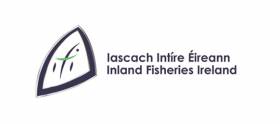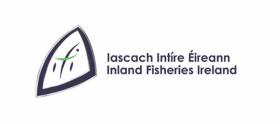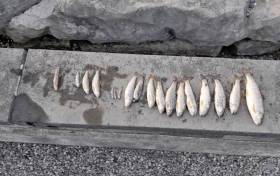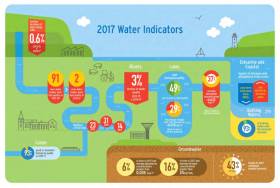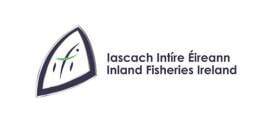Displaying items by tag: fish kill
Inland Fisheries Ireland (IFI) says it is investigating a serious fish kill incident at Barnagrow Lake near Shercock in Co Cavan, within the Annalee River and Upper Erne catchment area.
Environmental and fisheries officers from the North-Western River Basin District were alerted to the incident by a call from a member of the public this past Tuesday (27 July).
And the State agency responsible for the protection and conservation of freshwater fish and habitats estimates that there could be in excess of 5,000 fish mortalities, including species such as bream, roach, perch and pike.
Fish samples have been taken from the lake and removed for further analysis. Initial investigations indicate that a severe algal bloom, combined with high water temperatures and low oxygen levels recorded in Barnagrow Lake, are the likely causes of the incident.
Dr Milton Matthews, director of the North-Western River Basin District with IFI, said: “Unfortunately, this is a very significant fish kill affecting several year classes of coarse fish and is the largest reported fish kill nationally to date in 2021.”
He added: “During the recent heatwave, very high water temperatures were noted at several angling locations, with temperatures of over 26 degrees [Celsius] for example recorded in Lough Sheelin, Co Cavan.
“In the days preceding the fish kill at Barnagrow Lake, a severe algal bloom was noted by Inland Fisheries Ireland staff, which together with very high water temperatures recorded locally, which were 22 degrees [Celsius], likely resulted in this serious fish kill event due to reduced oxygen levels in the water.”
Hundreds of Trout Lost in Co Antrim Fish Kill
Authorities in Northern Ireland are investigating a fish kill that’s claimed hundreds of trout in a stretch of the Three Mile Water in Co Antrim.
According to BBC News, many of the dead trout “were sizeable fish of spawning age”.
Officials at the Department of Agriculture, Environment and Rural Affairs (Daera) have not identified the origin of the alleged pollution incident.
It is also understood that water levels in the river have been low following the recent warm and dry weather spell. BBC News has more on the story HERE.
In other NI angling news, a Portadown man has been fined £1,000 after admitting a series of offences at the north lake in Craigavon, as ArmaghI reports.
At a recent sitting of Craigavon Magistrates’ Court, Gareth McLoughlin was convicted of fishing without a licence and permit, fishing on a closed fishery, obstruction and failing to provide his name and address to fisheries officers in an incident on 12 January 2020.
The court heard McLoughlin was observed angling with four rods at a lake which was at the time closed to angling, and fled the scene when challenged.
It could be years before a river at the centre of a recent suspected agricultural pollution incident in Co Tyrone is fully recovered, as the Belfast Telegraph reports.
The fish kill in the Aughlish River discovered over the May Bank Holiday weekend covered a five-mile stretch of the Northern Ireland waterway between Dromore and Fintona, with reports of thousands of dead brown trout and young salmon to the Loughs Agency.
Omagh Anglers secretary Terry Smithson said the incident was “devastating”. He estimated that five years of salmon stock had been lost and it could be as many as three years before the waterway recovers.
The Belfast Telegraph has more on the story HERE.
Northern Ireland’s Agriculture Minister has confirmed that a fish kill in a tributary of the River Moyola last week was caused by a spillage of 30,000 gallons of slurry, as BBC News reports.
The incident on the Grange River in Co Derry on Thursday 21 May affected a significant stretch of water near the village of Desertmartin, according to a local angling club.
It’s understood that the spillage originated from an over-ground slurry tank, but the circumstances are still being investigated.
The incident comes just weeks after anglers in Co Armagh expressed anger at the killing of more than 1,000 wild brown trout by pollution in the Glenavy River.
Anglers’ Anger Over Fish Kill in Co Antrim River
Anglers in Co Antrim have expressed their anger after more than 1,000 wild brown trout were killed in a pollution incident at the weekend.
As the Belfast Telegraph reports, members of the Glenavy Conservation and District Angling Club spotted a number of distressed fish gasping for air in the Glenavy River on Friday (8 May).
An initial count of some 500 dead fish was later doubled to over 1,000, linked to what the angling club suggests was a pollution incident close to the Gobranna Road in Glenavy.
“Hundreds, possibly thousands” of other, smaller fish such as stone loach were also “wiped out” in the fish kill, says club chairman Anthony McCormack.
The Belfast Telegraph has more on the story HERE.
It’s understood that hundreds if not thousands of fish including brown trout, juvenile salmon and bream may be affected by a fish kill on a tributary of the Bandon River in Co Cork.
Inland Fisheries Ireland (IFI) says it is investigating the fish kill on a minor tributary of the Bandon River in Co Cork in the stream south of Dunmanway near Curraghalicky Lake.
IFI says it attended the site on Monday evening (26 August) following a report from a local angler — and initial investigations point to “a significant algal bloom” as the cause.
“Efforts are ongoing to assess the extent of the fish kill and an aerial survey of the lake is underway,” IFI adds.
“Cork County Council has taken water samples from the lake and river and is liaising with Inland Fisheries Ireland in their investigation.”
Inland Fisheries Ireland (IFI) says it has confirmed a significant fish kill on the Royal Canal in Kilcock, Co Kildare earlier this week.
A report was received on Monday 1 July from Waterways Ireland of the fish kill, which has claimed some 300 fish of various species including roach, rudd, bream and pike.
The investigation, which commenced immediately and remains ongoing, has identified agricultural discharge to a River Ryewater feeder that enters the canal at Kilcock.
IFI says work is now ongoing to ensure that there is no further polluting discharge to the system from this location.
It has also has issued a fresh appeal to farmers to remain vigilant in avoiding water pollution during the summer months when harvesting silage and spreading slurry.
Silage effluent is a significant pollutant and if allowed to enter a waterway can potentially lead to fish death and habitat degradation.
IFI has a confidential hotline number at 1890 34 74 24 or 1890 FISH 24 for the public to report incidents of water pollution, fish kills and illegal fishing. For more visit fisheriesireland.ie.
Irish Water Prosecuted Over Fish Kill In Tipperary
#FishKill - Inland Fisheries Ireland (IFI) prosecuted Irish Water yesterday (Tuesday 5 February) at Ballina District Court for the discharge of a harmful substance into the Ballycorrigan River on 17 May last year, causing a fish kill.
Among the fish mortalities were 100 brown trout of different age groups, three juvenile salmon and one stone loach which were killed when a cleaning substance was discharged into the river.
Judge Patrick Durcan heard evidence from Michael Fitzsimons, a senior fisheries environmental officer with IFI, that a detailed investigation was carried out following a pollution report received from the general public.
It found that the fish kill was caused by a combination of effluents arising from an uncontrolled maintenance event from Irish Water’s Ballina/Killaloe wastewater treatment plant.
Irish Water entered a guilty plea. Judge Durcan directed Irish Water to pay IFI’s legal costs of €2,290 and fined the body €2,500.
Judge Durcan stated that Irish Water did not take into consideration the environment and conditions when discharging into the river and that Ireland’s rivers are its most important natural resource.
He said that while these resources are maintained under the vigilance of Inland IFI, Irish Water needs to be vigilant, too.
Amanda Mooney, director of the Shannon River Basin District with IFI, said: “Irish Water co-operated fully with Inland Fisheries Ireland’s investigation and updated its cleaning protocols for the use of chemicals in treatment plants nationwide with more appropriate methods now in use as a direct result of this incident.
“Our fisheries resource is an extremely valuable asset, both from a recreational and economic perspective and it is crucial that we continue to protect and conserve it for future generations to enjoy.”
Historic Low In Fish Kills Welcomed - But Water Quality Concerns Remain
Inland Fisheries Ireland (IFI) has noted with caution the findings from the Environmental Protection Agency’s (EPA) report on water quality in 2017.
While it welcomes the fact that the number of fish kills in Irish waters were at a historic low last year, IFI is calling for continued awareness of water quality issues in light of the EPA’s conclusion that water quality is once again in decline.
According to this latest report, there was 14 fish kills in 2017, affecting 7.8km of river with 2,123 dead fish recovered. This is significantly lower than the worst years of 1987 and 1989 when there were more than 100 fish kills reported.
IFI’s Environmental Officers carried out 26,000 environmental inspections last year across agricultural sites, habitats, industrial sites, wastewater and water treatment plants, civil engineering sites and forestry sites.
Despite the positive drop in serious pollution events causing fish mortalities, IFI remains concerned about the reduction of water quality, with the EPA reporting a 3% drop in river water quality since 2016 and a 0.6% loss in high-quality river sites.
The inland fisheries and sea angling resource contributes €836 million to the Irish economy every year and supports 11,000 jobs in rural communities.
“Ireland has some of the best wild fisheries in Europe and while water quality in Ireland still compares favourably with our European neighbours. The current decline is a source of concern as any impact on the quality of our waters can have a negative impact on the freshwater fisheries resource,” said IFI chief executive Dr Ciaran Byrne.
“Not only is the quality of our natural environment and aquatic habitat inextricably linked to the appeal of Ireland as an angling and holiday destination, it is also a very important source of wellbeing for our people.
“It is essential that we protect and conserve our freshwater assets, meaning our rivers and lakes. The long-term conservation of the resource requires maintenance of healthy and ecologically viable ecosystems.
“That means that we need to prioritise monitoring and protecting water quality as well as dealing with other issues such as removing fish migration barriers, improving practices which cause physical changes to fisheries habitat, dealing with changes in water quantity and controlling the spread of invasive species,” Dr Byrne added.
Fish Kill Confirmed On 5km Stretch Of Dublin’s River Tolka
#Angling - Inland Fisheries Ireland (IFI) has confirmed a fish kill on the River Tolka that was reported earlier this week.
Fisheries investigators found dead fish over a 5km stretch of the river in the Tolka Valley Park area, following the report on Tuesday 18 September.
According to IFI, a “significant source of polluting material has been identified” and samples were taken for analysis.
In the meantime “relevant parties are undertaking appropriate remedial action” as the investigation continues.
Also this week, Minister of State for inland fisheries Seán Kyne committed €300,000 for the removal of an invasive waterweed in Lough Corrib.
IFI will begin operations in 2019 to remove the aquatic plant Lagarosiphon major from the lough, after successful cutting and picking operations over the summer months this year.
In addition to these management operations, IFI commenced a research project last month which aims to establish the current distribution of L major in Lough Corrib.
New innovative methods are being trialled to survey the aquatic plant as part of this research. These include unmanned aerial drones, sub-aquatic remotely operated vehicles (ROVs) and modern remote sensing techniques.
Speaking as he visited IFI’s stand at the National Ploughing Championships, Minister Kyne also asked the fisheries body and his department to continue liaison with the National Parks and Wildlife Service (NPWS), who have responsibility for the legislation covering Alien Invasive Species (AIS).



























